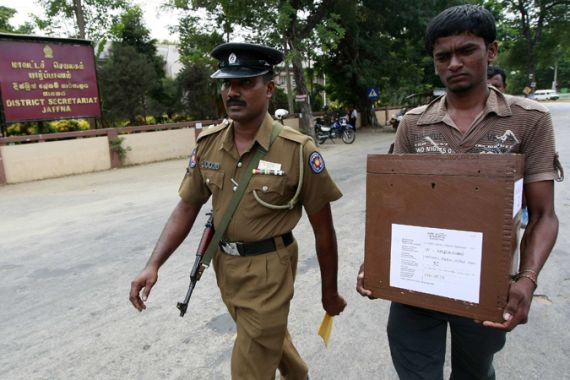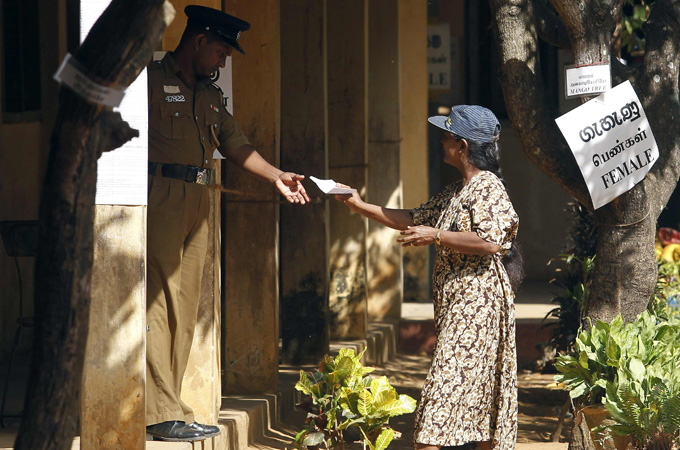Sri Lankans vote in local elections
One person dead and others allegedly beaten ahead of polls in many areas, including Tamil regions hit by civil war.

 |
| Some people are electing councillors for the first time in 29 years [Reuters] |
Voters in Sri Lanka’s northern Tamil heartland have trickled into polling stations to choose local councils, despite reports of voter intimidation, with some people allegedly being beaten up and one person killed overnight.
In some areas hit by the civil war, which ended in May 2009, people are electing councillors for the first time in 29 years.
Hours before polling opened on Saturday, a supporter of the ruling United People’s Freedom Alliance was killed in the central Anuradhapura district following clashes between rival party supporters, police said.
Late on Friday, a group of unidentified armed men went to more than 20 villages trying to forcibly grab polling cards from voters, reported the Campaign for Free and Fair Elections (CaFFE).
“The people who refused to give away their polling cards were beaten up and threatened to cut their throats out,” CaFFE said.
Armed soldiers stood guard on Saturday throughout Jaffna, the capital of Sri Lanka’s northern province and the main Tamil city.
Polling around the main roads of Kilinochchi remained fairly peaceful with many voters turning up early to cast their ballots.
But Jehan Perera, the executive director of the national peace council of Sri Lanka, told Al Jazeera that “due to the high level of military in the area, as well as paramilitary groups, the people are intimidated”.
Self-rule mandate
The local elections have gained unprecedented national significance, with some Tamil political party leaders saying a victory would be a mandate to press for self-rule in the South Asian island nation’s Tamil-majority north and east.
The Tamil Tigers, an ethnic-based political organisation, battled the Singhalese ethnic government in Sri Lanka for 25 years, until the civil war ended with the Tamil’s defeat in May 2009.
The country’s ruling party hopes a victory for its allies would blunt calls for an international war crimes investigation and vindicate the harsh tactics that allegedly killed thousands of Tamil civilians in the final months of the war.
Residents who have faced years of violence and forced boycotts have been less enthusiastic about voting in past elections, and many have been preoccupied trying to build their post-war lives.
“The last time I voted was in 1982,” said Kalli Amma, 66, who was displaced numerous times during the decades-long separatist war.
“I hope my vote will help to elect officials who will help displaced people like me.”
The Tamil regions in the island’s north and east, areas once controlled by the Tigers, account for 26 of the 65 local council races that were being decided on Saturday.
There are no reliable pre-election polls to predict the outcome, but Tamil politicians said alleged intimidation of Tamil candidates should raise concerns about possible government interference in the results.
They accused ruling party supporters of campaigning long after the stipulated time and using the army to influence the voters.
Gaining post-war ‘confidence’
Sri Lanka’s top officials, including President Mahinda Rajapaksa and cabinet ministers, jumped into the fight for minority Tamil votes, with help from a pro-government Tamil paramilitary-cum-political party.
Officials have cut ribbons on projects for sports complexes, played cricket with local youths and promised to rebuild Tamil homes in efforts to gain support in areas that had previously been politically excluded.
This victory “is of value to the government”, Mahindananda Aluthgamage, the sports minister, told the AP news agency earlier while campaigning in the former northern Tiger base of Kilinochchi.
“It will enable us to tell the world that we have won the confidence of the Tamil people after winning the war,” he said.
But Perera said the mainstream political attempts at garnering support in the Tamil regions have actually been detrimental to polls, because “the presence of the military deters people from coming to those meetings”.
Since the war ended in 2009, the former proxy Tamil National Alliance, or TNA, has won most of the region’s parliamentary seats, but local elections held last year in Jaffna dealt the TNA a major blow by handing control to the governing coalition.
The government has said the result proves Tamils are open to working with mainstream politics and are keen to reap its campaign promises including the release of war prisoners, reconstruction of destroyed homes, and reviving commerce and the job market in communities shattered through the quarter-century war.